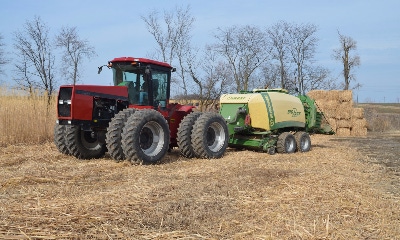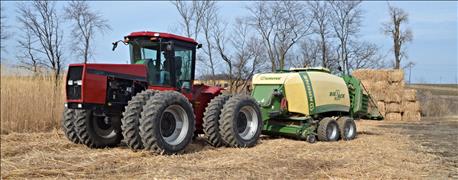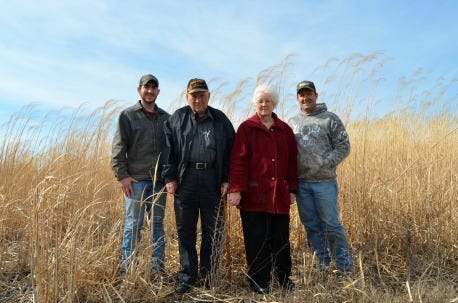
Miscanthus harvest is almost finished at Stegner Farms in Missouri with yields up roughly 30% this year. The crop that resembles a small bamboo shoot continues to offer growers an opportunity to make money on marginal ground.
LeRoy and Betty Stegner have 225 acres of established miscanthus in the gentle prairie land of Cooper County in west central Missouri. The couple's first harvest in 2013 saw yields of 600 tons. Last year, that amount increased to 850 tons. "We are looking at 1,100 tons this year," says Miles Stegner, the son of LeRoy and Betty. "It has been amazing to watch the yields keep increasing year after year."

HARVESTING BIOMASS: Miscanthus harvest is almost complete in Missouri. Farmers like the Stegner family in Cooper County are realizing increasing yields year after year.
And according to Betty, crop values increased as well. While other commodities are facing a market downturn, she says miscanthus prices went up by $5 per ton over last year to $75 per ton.
It is a crop with limited input costs. A biomass company planted the first miscanthus rhizomes. Since then there has been costs associated with fuel and farm machinery upkeep. The Stegners harvest, bale and then mow the crop. "This year we may need to fertilize just a bit," Betty explains, "but that is the first time since we started growing the crop."
Well into their 80s, the couple no longer is able to farm as actively as they would like. LeRoy saw the crop as an opportunity to keep the century farm in the family.
Dalten Stegner, the third generation on the family farm, manages harvest during the winter months. A welder by trade, he says the winter harvest fits well into his off-farm occupation. "Harvest usually occurs during our down time," he notes. Harvest typically starts in December and wraps up by mid-March depending on weather conditions.

FAMILY AFFAIR: The Stegner family comprised of Dalten, LeRoy, Betty and Miles, have been growing miscanthus for five years on their farm outside of Pilot Grove, Mo.
"We have to wait until we can harvest at 18% moisture," Dalten notes. "It also has to be cold enough that we can get across the ground."
The family stores the large square bales at the farm until Renew Biomass--the company the family contracts with for production--comes to pick them up. "We put them under a tarp because it will soak up moisture," Dalten adds.
The Stegners first started growing miscanthus five years ago as part of the MFA Oil Biomass miscanthus project. In 2011, the project, which was a partnership between Aloterra Energy and MFA Oil Company, received $14.6 million from the USDA through the Biomass Crop Assistance Program (BCAP) for growing the perennial crop to use as an energy source.
Under the BCAP program farmers received up to 75% of planting cost and pay an annual rent while farmers wait for their crops to mature, which generally takes three years. After crops mature, farmers will be eligible to receive two years of matching payments for their tonnage, up to $45 per ton beyond selling price.
In 2015, MFA Oil Biomass sold its assets or miscanthus acreage to Renew Biomass, a Missouri-based company. The company acquired approximately 4,000 acres in Missouri and 4,000 in Arkansas, according to Renew Biomass communications director Lynzee Glass.
The company's facility in Aurora located in the southwestern part of the state grinds the crop for various markets. One new venture is using miscanthus in the dog food industry. Renew Biomass partnered with Kansas State University to develop dog treats, as well as kibble. The company recently launched its own pet food division known as M-Fiber.
Growing miscanthus works for the Stegner family. "It provides us with income from our ground that does not require a lot of input or labor," Betty notes. "It allows us to keep the farm in the family," LeRoy adds. "It is something for the next generation."
About the Author(s)
You May Also Like






